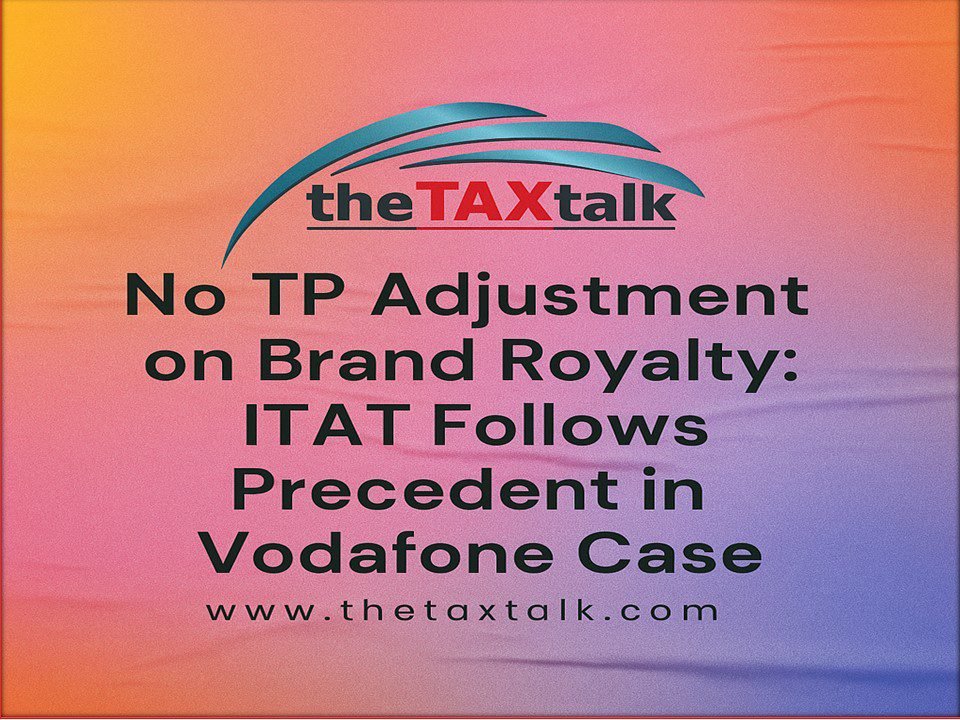![]()
No TP Adjustment on Brand Royalty: ITAT Follows Precedent in Vodafone Case
The Delhi Bench of the Income Tax Appellate Tribunal (ITAT) has set aside a ₹120.54 crore transfer pricing (TP) adjustment related to brand royalty payments made by Vodafone Idea Ltd for Assessment Year (AY) 2012-13. The ruling in Vodafone Idea Ltd vs ACIT addresses critical aspects of transfer pricing methodology, use of comparables, and substantiation of commercial benefit—issues significant to taxpayers dealing with international transactions under the Income Tax Act.
Background of the Case
Vodafone Idea Ltd had paid brand royalty to its associated enterprises (AEs) for the rights to use the trademarks and trade names ‘Vodafone’ and ‘Essar’. These payments were part of the company’s broader international transactions governed by transfer pricing provisions.
The assessee applied the Transactional Net Margin Method (TNMM) to benchmark its royalty payments. However, the Assessing Officer (AO) and Transfer Pricing Officer (TPO) disagreed with this approach.
Dispute Over Use of Trademarks and Benchmarking
The TPO took issue with two main elements:
1. Essar Trademark: The TPO claimed the ‘Essar’ brand lacked any tangible market recognition. Consequently, the royalty paid for this trademark was disallowed entirely, with its Arm’s Length Price (ALP) determined to be NIL.
2. Vodafone Trademark: The TPO rejected the assessee’s selection of comparables and re-calculated the ALP by capping the royalty rate at 0.25% of gross sales. This was against the assessee’s actual payment of 0.70% of net service revenue.
These adjustments cumulatively resulted in a TP addition of ₹120.54 crore.
Tribunal’s Ruling and Reliance on Group Case
The ITAT found that the issues in the present case were materially identical to those in earlier cases involving Vodafone Idea’s group companies—Vodafone West Ltd and Vodafone Digilink Ltd—as ruled by the Ahmedabad Bench of the ITAT.
In those cases, the TPO had similarly substituted ALP using related party transactions instead of relying on comparable uncontrolled transactions, which went against the principles laid down in transfer pricing regulations. Citing consistency and the principle of judicial discipline, the Delhi ITAT followed those rulings and deleted the entire TP adjustment.
Key Takeaways for Taxpayers and Finance Professionals
• Importance of Consistent Jurisprudence: This ruling highlights the value of consistency in TP cases, especially when involving group companies with similar transaction structures.
• Use of Related Party Transactions: The ITAT reiterated that adjustments must be based on genuine comparable uncontrolled transactions—not on related party data.
• Benchmarking Royalty Payments: Assessee should ensure robust documentation and commercial justification when paying royalties, particularly when brand value or market recognition is contested.
This ITAT ruling reinforces the importance of methodical TP benchmarking and highlights the potential for successful dispute resolution where prior judicial precedents are appropriately applied.
The copy of the order is as under:


